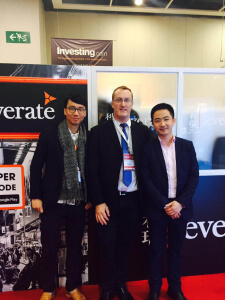“An FX platform vendor is as much a people business as it is a technology business” says Jordana Barkats
Maintaining the right combination of technological prowess and ensuring that the most talented professionals continue to be instrumental to the ever-evolving development of every aspect of the end to end solutions that are in use by the majority of retail FX brokers around the world today. Focusing on the human capital aspect of the business […]

Maintaining the right combination of technological prowess and ensuring that the most talented professionals continue to be instrumental to the ever-evolving development of every aspect of the end to end solutions that are in use by the majority of retail FX brokers around the world today.
Focusing on the human capital aspect of the business is critical, and quite simply employing geniuses and professionals with creative minds is the modus operandi of today, especially in such a demanding world in which the days of the standard MetaTrader 4 platform and default back office are long gone, and sophisticated trading environments are now essential to maintain business from retail brokers and their ever more discerning clients.
Today, at the head office of FX brokerage technology provider Leverate in Tel Aviv, Israel, Andrew Saks-McLeod met with the company’s HR Manager Jordana Barkats to talk about why people matter more than any other aspect of the business.
How did you arrive at Leverate, and what essential skills did you bring to the recruitment aspect of the electronic trading industry?
My job is to try to understand people (candidates and employees) and their strengths and weaknesses, what value they bring to the company, their cultural fit and if they will be fun to work with. I also need to understand the company, our strategy, our core business and the various roles.
What key qualities are important when searching for executives within Leverate, especially within R&D, product and business development?
They need excellence, professionalism, a cultural/values match, natural leadership, vision, managerial skills and need to know how to lead and empower people. They also need to have a clear agenda, strong understanding of our business and customers. Lastly they need curiosity and creativity and to keep abreast of new ideas and technologies.

Fintech is a very competitive and avantgarde business. How do you recruit the very best and overcome counter-offers that they may receive from their existing employer should they tender a resignation in order to move companies and accept your offer?
It’s a delicate balance to hire the best, make a competitive offer and maintain internal fairness with current employees. We stay updated with the market value of candidates and provide more than just salary for employees. Studies show that once salary is above the threshold of what is considered good, it adds little to employee satisfaction, thus we try to provide other benefits for employees; a great working environment, interesting tasks, learning and career development among other aspects.
If an employee decides to stay with their current employer that is unfortunate, but we let them go because they clearly do not understand or appreciate the value and career advancement they will receive at Leverate. We want to hire people who are passionate about working here.
It is very much en vogue within the fintech industry to create a working environment that not only attracts the best talent but encourages their freedom of thought in order that they develop leading edge software and ancillary products. Is there still merit in this, and is it cost effective?
We encourage transparency, collaboration, learning and creativity and give employees the freedom to think out of the box. That’s where the really great ideas come from. Also internal communication is important, to share ideas vertically and laterally, to cross-pollinate and see the big picture. I believe although there are short term costs, long term it is cost effective for the company as it helps us retain our competitive edge.
Leverate is a very international business and has commercial customers all over the world. What are the challenges in terms of human resources when working internationally?
There are numerous challenges, cultural differences, language barriers, even time differences are significant. Many companies are struggling to manage the challenges of globalization.
To overcome these challenges the company needs to develop a global approach and international orientation. People need to make efforts to communicate thoroughly and clearly, a sense of humor helps and we make sure people from different worldwide locations meet face to face, even though the costs for flights are high, because overall the benefits outweigh the drawbacks.
What is a typical day, and are there any interesting faux pas that you’d like to share?!
Our work is interesting. A typical day can combine working with people internally and externally, reading CVs, interviewing, working globally with different kinds of people, supporting employees, planning training and workshops, managerial development, creating performance reviews and planning fun activities.
To do the work well you have to care about the people and the company. Here and there I come across the CV of someone I know personally which is awkward.
Featured photograph at Leverate, Tel Aviv, Israel. Copyright FinanceFeeds









